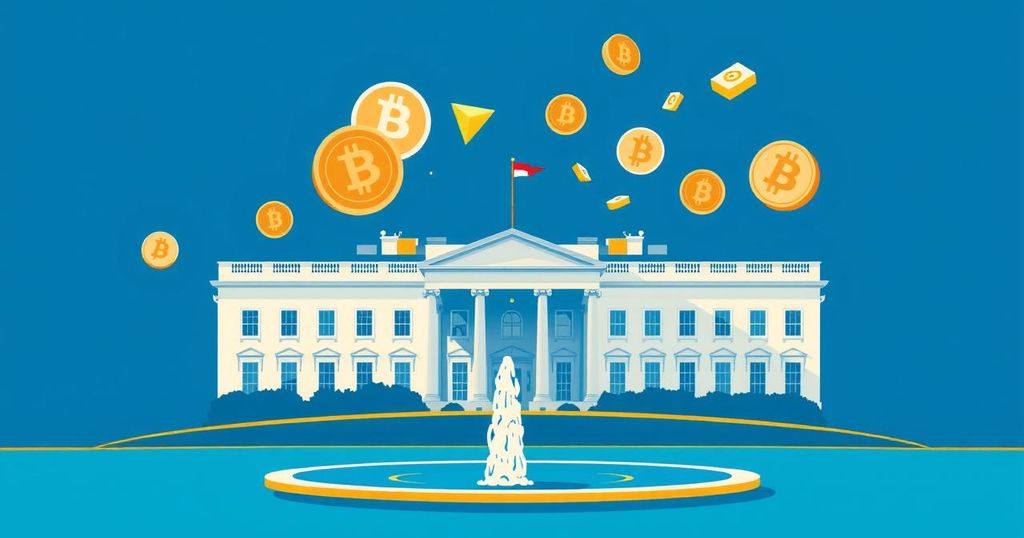Key Crypto Policies to Monitor in the U.S. This Year
With new congressional leadership in the U.S., the cryptocurrency sector is looking for clearer regulatory guidelines. Three key focus areas emerge: establishing a bitcoin national reserve, clarifying SEC and CFTC jurisdictions, and defining stablecoin regulations. Lawmakers must navigate a complex regulatory landscape while fostering innovation versus consumer protection. Leadership changes post-midterms may offer a pro-crypto tilt, yet much remains unresolved, needing collaborative efforts to ensure effective legislation.
As the 119th U.S. Congressional session kicks off, there’s a palpable buzz in the cryptocurrency sector, which is hoping for clearer and more welcoming regulations. With President Trump’s prior commitment to making the U.S. the “crypto capital of the planet”, the feeling is that things might finally begin to shift. After the recent midterms, 250 pro-crypto House members and 16 senators join the conversation, indicating potential support for this digital economy.
However, much still hangs in the balance. While the new administration seems poised for significant regulatory action, what’s really essential is the actual drafting of robust policies that will be sent to House or Senate committees for evaluation. Among things to keep an eye on are: possibly creating a national reserve for bitcoin, determining whether the SEC or Commodity Futures Trading Commission (CFTC) will manage various aspects of the industry, and sorting out the rules for stablecoin issuance—the nuances of which have yet to be defined.
In the previous session, two pivotal bills were put forward—one focused on stablecoins and another on overall digital asset market structure. Unfortunately, they did not progress beyond initial reviews in the second chamber, signalling an uncertain path forward.
Despite the pro-crypto leanings of the new Congress, addressing these issues requires teamwork among lawmakers, regulatory bodies and industry professionals. Can they build a solid regulatory framework that both encourages innovation and offers adequate consumer protection? These aren’t simple questions, and answers demand urgent, actionable solutions.
The current regulatory realm for cryptocurrencies is fragmented, akin to the blockchain technology itself. According to various opinions, bitcoin and ethereum could be classified as CFTC-regulated commodities or SEC-regulated securities. Smaller tokens face even fuzzier designations, making it hard for companies in this field to navigate a complex legal landscape.
For many startups, how a token is classified can change everything; if deemed a security, it opens up a Pandora’s box of strict registration and compliance rules. This inconsistency can even push innovation to friendlier shores—not something the U.S. wants to see.
Interestingly, amid calls for clearer oversight from either the SEC or the CFTC, there’s a likelihood that stablecoin regulations might take precedence. Republicans and Democrats on the House Financial Services Committee reportedly came close to reaching an agreement last year on stablecoin legislation. Plus, Europe has already made strides with its own regulatory framework for crypto, the Markets in Crypto-Assets (MiCA), which explicitly addresses stablecoins.
Marta Belcher, who leads the Filecoin Foundation, pointed out a significant debate over whether stablecoins should be required to maintain a one-to-one backing with the U.S. dollar. She argues such an obligation might set an unreasonable standard compared to other sectors.
Among the more ambitious proposals is the idea of a national bitcoin reserve. According to advisors from Trump’s team, this could involve the U.S. bolstering its holdings of bitcoin to perhaps emerge as a preeminent global entity in cryptocurrency. However, actualising this vision would need unprecedented coordination between Congress, the Federal Reserve, and the Treasury—a tall order.
While many speculate on the likelihood of complicated regulations, it seems the new administration may lean towards easing the path for crypto rather than creating hurdles. Ripple CEO Brad Garlinghouse even mentioned in a recent social media post that, post-election, their company has inked more U.S. deals within a six-week window than the past half-year. He suggests the “Trump effect” on the crypto scene is tangible and shifting.
However, lawmakers’ slow reaction times might hinder matching the pace of innovation in the crypto space. The crux of the issue is that crypto doesn’t quite fit into the existing regulatory frameworks. Without proper oversight, the rush for growth might expose the market to potentially serious risks that Congress will need to pay attention to.




Post Comment